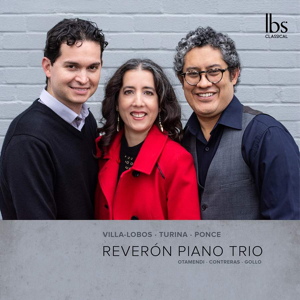
Heitor Villa-Lobos (1887-1959)
Primeiro Trio in C minor (1915)
Joaquin Turina (1882-1949)
Trio No. 1 in D major, op. 35 (1926)
Manuel Ponce (1882-1948)
Trio Romántico (1912)
Reverón Piano Trio
rec. 2021, Auditorio Manuel de Falla, Granada, Spain
IBS Classical IBS202022 [79]
The works on this well-filled disc have been very intelligently chosen: the composers born within five years of each other, all with a link to the Iberian peninsula, but with sufficient stylistic differences to make for a satisfying listen. None of the works is exactly over-represented in the catalogue, the Turina, which just creeps into double figures, being the most recorded.
The Villa-Lobos trio, the first of three, all written in the 1910s, is a compact work of just over twenty minutes. It seems to me very much influenced by music of the late 19th century, yet reviewers writing after its first performance were critical of its modernism – I don’t hear that at all. For the final movement, we go back even further; Villa-Lobos shows off his skill at writing fugues, and of course, his great love for Bach (this predates the first Bachianias Brasileiras by more than a decade). It is some time since I listened to this piece – the other recording I have is on an early Marco Polo disc – and I am quite sure that I was fairly underwhelmed by it. This new version changes my opinion entirely.
Turina’s Trio No. 1 is actually his second in the genre, the first in F major from more than twenty years earlier is unnumbered, as the composer supposedly felt it didn’t represent his Spanish-infused mature style. The first movement is a Prelude and Fugue, permeated by Spanish rhythms. The second is a set of variations, incorporating influences from several Spanish folk traditions. The final movement is perhaps the least obviously Spanish, though it does return to some of the material from the first movement. My colleague Gary Higginson recently reviewed a set of the complete Turina trios (also on IBS Classical, a recording that is in my to-be-reviewed stack) and commented that his music deserves to be better known outside his native land, a sentiment with which I wholeheartedly agree. The Reverón Piano Trio give the work a very intense and soulful reading, much more so than my previous favourite version (Lincoln Trio on Cedille – review). The booklet notes use the adjective “searing” to describe the violin’s opening pages, and that is exactly how the trio plays it. It has a quite different feel to the Lincoln’s, and I don’t think I can say one is better than the other, because they are so different. Let’s settle for “they are both very good”.
The Ponce trio was new to me, not too surprising as this seems to be only its third recording, in the CD era at least (the other two are on a defunct label, and a very obscure Spanish one). It is well-named, full of rich and emotive melodies, especially the slow second movement, which bears the title Andante Romántico. The Scherzo has what I felt was a Mexican feel, though the booklet notes say that no Mexican folk elements were included in the work. Having now made its acquaintance, it is undoubtedly a trio to which I will return.
The Reverón Piano Trio comprises pianist Ana María Otamendi, violinist Simón Gollo and cellist Horacio Contreras, all of whom were born in Venezuela, but are now resident in the United States. I have already remarked about the better impression I had of the Villa-Lobos because of the Reverón’s performance, and that flair and passion comes across in the other works as well. This appears to be their first recording; the Recordings page on their website only points to live performances on YouTube (including movements from the Villa-Lobos and Ponce trios). The recording is good, and the notes are excellent.
These three very fine works deserve to be better known, and these passionate performances by the Reverón Piano Trio cannot help but spread the word.
David Barker
Help us financially by purchasing from




















